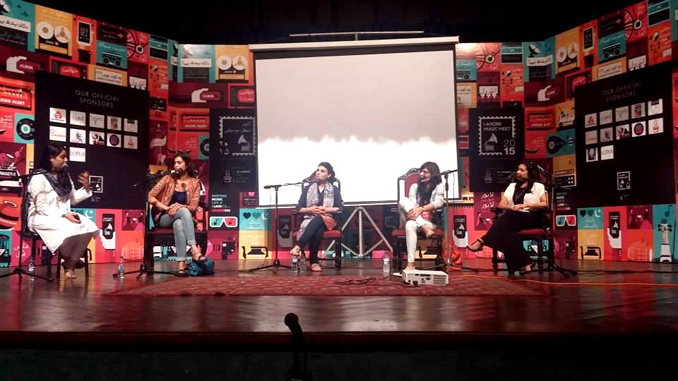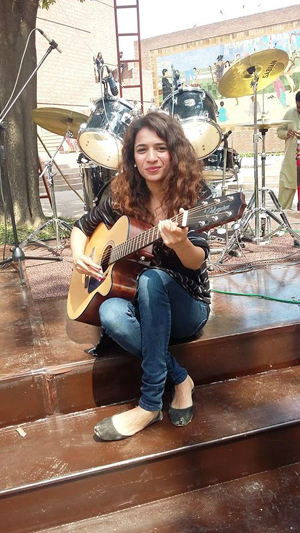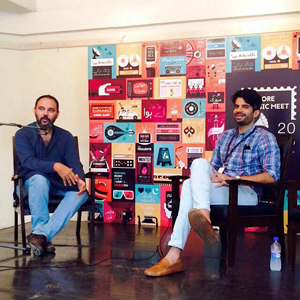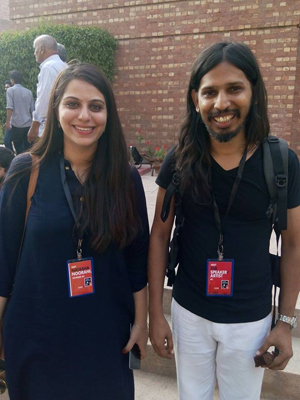Written by: Yusra Hayat
Posted on: April 09, 2015 | 
Noor Zehra with her Sagar Veena
The Lahore Music Meet invited expert musicians to conduct workshops in order to educate and encourage aspiring musicians and to foster a sense of community within the musical fraternity of the country. “This event is simply a labor of love: all the founders are young music enthusiasts who wanted to bring together people representing different strands and aspects of the music industry, and provide them with a platform to hold conversations and debates”, stated Noor Habib, one of the founders.

One of the first sessions on day I was titled: ‘Marketing Yourself as a Musician’, and it featured Selina Rashid from Lotus Public Relations, Ravail Sattar (drummer of the band Poor Rich Boy), Waqas Ahmad (specialist in music copyrights), and artist Jimmy Khan. The audience entered the hall expecting certain guidelines and tips on successful marketing strategies for aspiring musicians, and was surprised to hear a conversation focused on the shortcomings of the Pakistani music industry and the panelists’ emphases on the dire need to overcome them. This surprise was in many ways quite pleasant, as Almas humorously tackled the issues of the industry, grounding his arguments in the cultural context of the country. He discussed stereotypes and labels faced by Pakistani musicians such as the derogatory term “marasi”, the imposition of entertainment taxes on Pakistani performers, and the clever use of avenues like SoundCloud and YouTube by aspiring musicians, which could defeat the monopoly of corporate patronage.

The jovial session was followed by a controvertible, yet highly intriguing talk called ‘Her Story: Women in the Musical Space’, featuring Fariha Pervez, Zoe Viccaji, Sara Haider and Eva Shafique. Each of the musicians delved into her journey to success, the obstacles faced, and how she overcame them. While Viccaji highlighted the ease with which she entered the industry, Haider chalked out her struggles and the constant fights she would put up in her early days to secure a slot in the underground scene. Whereas Shafique and Viccaji highlighted their independence as females as the focal point of debate, Pervez mentioned how a male manager was an absolute necessity to survive in the industry. These divergent views demonstrated the richness and authenticity of the dialogue. “This controversy is healthy”, remarked Hasan Abbas, one of the founders, “It is precisely what we wanted – several expert voices under one roof, in front of people who would not just come here to enjoy music but also understand the different facets of music.”
In addition to the stimulating discussions indoors, the Lahore Music Meet also featured outdoor performances by various underground musicians, including Shajie, Sameen Qasim of Nescafe Basement, and Shazeb Khan of Those Retards. The latter’s rendition of Elvis Presley’s Jailhouse Rock brought out the true fervor of spring gaiety at the festival, as the crowd broke into a trance-like dance in the center of the garden. Sachal Orchestra’s reinterpretation of John Lennon’s Imagine, as well as many local songs, brought the perfect conclusion to a thoroughly enriching and entertaining day.

Day II commenced with a heightened sense of joie de vivre, and people’s expectations were high due to the success of the previous day. At first, many people were disappointed by the absence of Imran Raza and Sahir Ali Bagga from the session titled, ‘The Art and Business of Film Scoring’. However, acclaimed director Jami saved the day as he steered the session and altered it into a candid and engaging conversation with the audience. He emphasized on the significance of music and video as two abstract art forms that beautifully merge into a coherent whole. He further discussed the misunderstandings associated with these forms and the ways to alleviate them.
This was followed by ‘A Musical Conversation with Gumby’, where an elaborate setup with Ahsan Bari on the guitar, Rakae Rehman Jamil on the sitar, and Farhan from SYMT on bass guitar awaited the audience. Gumby joined them on drums to initiate a freestyle jam session for about fifteen minutes, to enact a real jamming session where the musicians play freely, interact with each other, and create “their own environment”. This dramatic performance was followed by a question-and-answer session, where Gumby explained how he was always attracted to the loudest instruments as a child, and would practice in his house to comprehend the nuances in beats. He also explained that performing with experienced artists like Abida Parveen and Mekaal Hasan assisted in the evolution of his own music, by bringing newer and more innovative dimensions to it.

‘The Art of Performance’ with Aziz Ibrahim was unique in its presentation, as it traced the artist’s struggles of being a Muslim musician in the United Kingdom, and also featured the display of his fascinating new equipment, including a customized pedal board and amplifiers.
Other sessions incorporated the misconceptions of metal music in Pakistan as the “loud and noisy” genre and enunciated the need to be passionate about music, despite the barricades imposed by society.
The Lahore Music Meet 2015 was not simply a celebration of music, but a festival that aimed at creating a strong musical kinship that would facilitate future collaborations. The founders were cognizant of the fact that music, particularly for would-be musicians, is accompanied by politics, obstacles, and often a lack of resources, but contains at its very core, an indomitable spirit that surges against all odds.
You may also like: